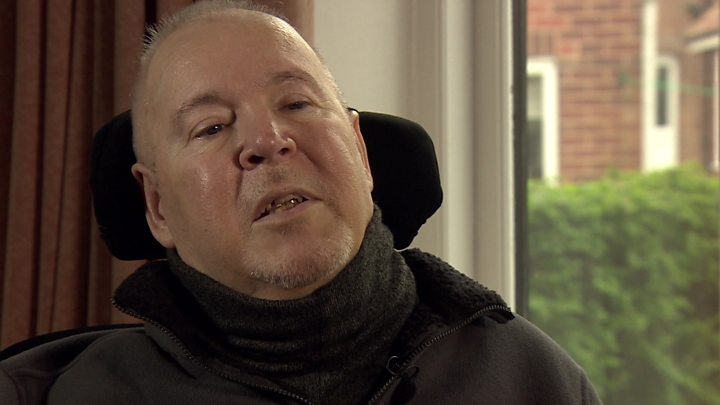Assisted suicide: Paul Lamb renews bid for right to die

Media playback is unsupported on your device
A man who lives with chronic and excruciating pain has begun a fresh legal challenge to the law that criminalises assisted suicide.
Paul Lamb, 63, was paralysed from the neck down following a car crash nearly 30 years ago.
He lost a Supreme Court case in 2014, but argues that opinions on assisted dying have changed since then.
He says keeping him alive could be considered torture, and that the current law breaches his human rights.
Mr Lamb requires 24-hour care, and wants to be able to end his life at a time he chooses. But he would need help to do this, and assisting a suicide is a criminal offence carrying a maximum 14-year prison sentence.
The law sharply divides opinion with strong views held on both sides.
An organisation that promotes palliative care, Care Not Killing, says any change to the law puts vulnerable people under increased pressure to end their lives.
‘It can be construed as torture’
“When it’s bad it’s like I’ve been smashed on the back of the neck with a baseball bat, or I’ve been knocked over by a bus”, Mr Lamb says.
“The worst thing in the world is for someone to say ‘you’re going to be in pain for the rest of your life, and I’m going to make sure you’re here for a lot of years’. It can be construed somewhat as torture.”
His new challenge marks the next stage of the uneasy and complex journey in deciding where the law should stand on the right of those who wish to end their lives, but need assistance to do so.
He says the current law unfairly discriminates against people who are suffering incurably and are unable to end their own lives without assistance.
Mr Lamb wants to make assisted dying legal for those like him, and the terminally ill.
In 2014 Mr Lamb lost a case at the Supreme Court which had argued the current law breached the right to a private life of those in his position.
However, the court said parliament should be given the opportunity to re-consider the law.
Three bills, three defeats
Since then three bills have been introduced to Parliament attempting to legalise assisted suicide.
However, all three related only to those with a terminal illness who were expected to die within six months.
All three failed to become law.
Last year terminally ill Noel Conway lost his legal battle to be allowed medical assistance to die when he has less than six months to live.
However Mr Lamb’s new case, supported by Humanists UK – who campaign on issues of secularism and human rights – is significantly different.
He is not terminally ill and could live for many years to come. In that sense, his case is broader in scope than that of Mr Conway and the bills that failed to make it through Parliament.
Mr Lamb argues Parliament has failed to address the issue of those in his position, and so the courts must now intervene.
He also argues more people support legalising assisted dying.
The most recent research carried out by the National Centre for Social Research for the organisation My Death, My Decision indicates that 88% of people in England and Wales favour assisted dying for those who are incurably suffering, in at least some situations.
In addition, Mr Lamb points to the fact that other countries, most recently Canada, have allowed assisted dying, and the Royal College of Physicians has dropped its opposition to a change in the law.
‘A fundamental human right’
However, many see real danger to any change in the law.
Dr Gordon McDonald, chief executive of Care Not Killing, says: “The principal objection is that it puts vulnerable people in the position where they might feel under pressure, either from other people, from family members or other sources – or even just internalised pressure.
“They might just feel they are a burden and opt to commit suicide or have euthanasia. We should be caring for people at the end of life and looking after them’.
Around 50 British citizens a year travel to Switzerland, which does allow assisted dying, to end their lives.
While relatives or friends who assist out of compassion will not be prosecuted, medical professionals – including doctors and carers – could be.
Andrew Copson, chief executive of Humanists UK, says the right to die “in a manner and timing of your own choice is a fundamental human right”.
“It should not depend upon your ability to afford travel to Switzerland, nor force families into a heart-wrenching dilemma between letting their loved ones suffer, or supporting them and risking criminal investigation.
“Paul’s case will give the terminally ill or incurably suffering the dignity they deserve.”
Mr Lamb says he does not want to end his life abroad.
He wants to die at home surrounded by his loved ones.
“I just don’t really want to go out of this country. I feel like I’m being shoved out, an embarrassment to the country, get him out of the side door.
“No, no, it’s not right.”

